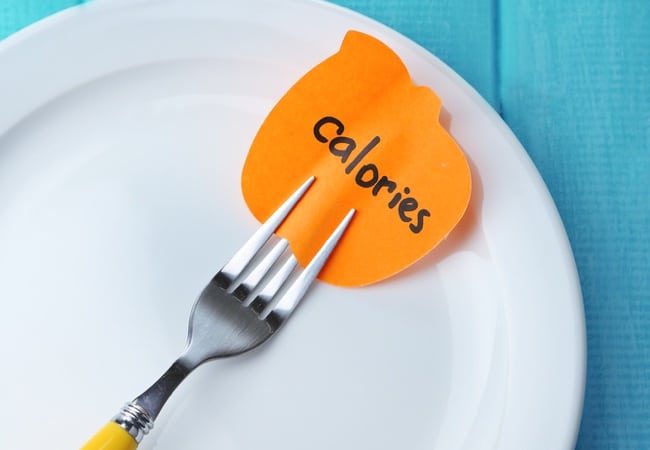
It is fairly easy to come up with an estimate of how many calories you should eat a day. You just need to plug in your age, sex, weight, height and activity level to our online calorie calculator and you will get an estimate on how many calories you need to eat per day to maintain your current weight.
The trouble with figuring out how many calories you need for weight loss is that everyone has unique, individualized needs.
There are some general equations and calorie tables that can be used as a guideline, and that can be a helpful tool as a starting point.
How Many Calories Should You Eat on Average?

On average women should eat around 1800 calories per day to maintain their current weight. When it comes to men, the average man should eat around 2500 calories per day to maintain their weight.
The Dietary Guidelines for Americans give a guide for estimated calorie needs based on age, sex and activity level (1).
For example:
- Sedentary women 31-50 years old require around 1,800 calories per day.
- Sedentary women over 51 years old require about 1,600 calories per day.
- Sedentary men 31-50 years old require about 2,200-2,400 calories per day.
- Men over 51 years old require closer to 2,000- 2,200 calories per day.
If you are moderately active or active, calorie needs go up.
For example, women 31-50 years old who are moderately active require closer to 2,000 calories per day compared to sedentary 1,800 calories per day.
Active women this age may require closer to 2,200 calories per day.
Sedentary activity level accounts for daily living activity. Moderate activity is equivalent to walking 1.5-3 miles per day around 3-4 MPH in addition to activities of daily life.
Active category is equivalent to walking over 3 miles per day around 3-4 MPH in addition to activities of daily life.
Calories Per Day Calculator
As mentioned above, one of the easiest and most effective ways to find out how many calories you should be eating in a day to either maintain your current weight or calculate how many calories lose weight, is to use our calorie calculator below.
Simply enter your details (age, gender, weight, height, activity level) and click the CALCULATE button.
How does the calorie calculation work?
These numbers are plugged into equations that calculate resting energy expenditure (REE) or also called basal metabolic rate (BMR).
The REE or BMR is calories your body uses to maintain normal function such as: heart beat, energy for brain function, making new cells, etc.
From this REE number that factors in weight, height, age and sex, an activity factor is added in. Moving the body expends extra energy.
Therefore, those who have a higher activity level have a higher calorie need. As age, weight and activity level changes, calorie needs will also change.
Knowing your estimated calorie level per day is a good place to start, but there are other factors to consider for health and weight regulation.
Calorie quality is just as important as quantity, and research studies also suggest when you eat can also influence weight regulation.
What is a Calorie?
A calorie is a way to measure the energy coming from food. The body uses energy from food to provide energy to all the cells of the body. One pound is equivalent t0 3500 calories.
So in simple terms, if you want to lose one pound, you should reduce your calorie intake to save 3500 calories. For every 3500 you save, you will lose 1 pound.
Calorie Intake Factors
Below are the factors that can affect the number of calories you should consume per day.
Age
Children and adolescents have high calorie requirements because they are growing. As we age into adulthood, calorie needs stabilize because growing stops.
As adults age into elderly years, calorie needs continue to go down. This is because the body does not replace body cells as much, and activity level usually declines as we age. Keeping a high activity level throughout adulthood can keep calorie needs higher.
Sex
A general rule of thumb is males tend to have higher calorie needs than females.
This is generally true because males, over all, tend to be larger in body size and typically have more muscle compared to females. However, this generalization can vary.
Activity level
One of the largest factors that is under our control that influences calorie needs is our activity level.
Drastically increasing your activity level can drastically increase your calorie need.
For example, a sedentary 50 year old female compared to a 50 year old female training for an IRONMAN triathlon will have very different calorie needs.
Their BMR level may be quite similar, but the woman training for the triathlon will have a higher calorie need as she is expending more energy as she swims, bikes and runs for training.
How Many Calories Per Day For Weight loss
If someone desires weight loss, a common recommendation is to take between 250-500 calories off your recommended calorie level.
For example, if your estimated calorie need is 1,600 calories per day, dropping your intake to 1,100- 1,350 calories per day has traditionally been recommended for weight loss.
However, keep in mind, sustainable weight loss can take more than just simply aiming for a lowered calorie number per day. There is concern for dropping calorie intake too low which could back fire for weight loss.
In general, a combination of cutting out low nutrient dense foods (soda, sweets, etc.) is recommended for weight loss while increasing high nutrient dense foods (fruits, vegetables, lean proteins, etc.).
Exercise can also not only bump up your calorie burn, but it can also protect lean muscle mass from being lost during rapid weight loss.
What you should know when counting calories?
Fitness apps, calorie counters and weight loss plans generally follow a basic guideline to determine calorie estimates. Your basal metabolic rate, plus your activity level plus taking into account you want to lose weight.
The Harris Benedict equation is a common method for getting a basal metabolic rate (BMR). It takes into account your age, sex, height and weight.
Many websites and fitness apps use this equation, or something similar (like the Mifflin-St Jeor equation), to get a baseline calorie amount. From this, you multiply an activity factor depending on the amount of exercise you do.
The higher your exercise level, the higher the activity factor will be. Sedentary is usually activities of daily living, moderate exercise is equated to walking about 1.5-3 miles per day and active is walking more than 3 miles a day.
People have a tendency to overestimate their fitness factor level. Make sure you are accurately estimating your fitness amount because that will impact your accuracy. This will give you an estimate of your body’s calorie needs.
The last piece is adding into the equation the weight loss factor. Since you want to lose weight, your intake should be less than your needs. Whatever amount your body needs, a general practice is subtracting anywhere between 250-500 calories per day.
How many calories that should be subtracted for weight loss depends on your baseline calorie amount, how much weight loss is desired and individual health.
Calorie quality is as important as calorie quantity
Knowing what your estimated calorie need per day is can be helpful for baseline information.
However, weight or health goals do not stop at just hitting a certain calorie number every day. The quality of those calories is just as important.
For example, the body handles 500 calories from fries and a soda differently than 500 calories from lean chicken, sweet potatoes and a side salad.
No matter what your calorie intake level, it is recommended to limit intake of added sugars and low nutrient dense foods.
Timing of food does matter
Research suggests not only calorie quantity, but also when you eat those calories may be an important factor for weight loss.
For example, a 2013 study (2) put research participants on two different eating patterns but both were the same calorie amounts. The only difference between the groups was one group ate most of their calories in the morning while the other group ate most of them at night.
After 12 weeks, the group eating most of their calories earlier in the day had greater weight loss and lower waist circumference compared to the other group.
Another 2013 study (3) found similar results. When research participants were put into two different groups with the only difference being when they ate most of their food, the group eating most of their calories earlier in the day had greater weight loss.
Researchers concluded weight loss efforts should include not only calorie intake recommendations but also timing of food recommendations.
What is healthy amount of calories to eat long term?
An important consideration for weight loss is what can be done for the long term and is considered healthy. Starvation or a near starvation diet can’t be sustained for long term weight loss and can have a harsh impact on your body.
Remember, it’s not all about the quantity of calories. The amount of nutrition you get with those calories is just as important. There are other things to focus on besides your calorie number for the day. Did you get the recommended amount of fruits, vegetables, antioxidants, fiber, omega 3’s, etc.
Lastly, no matter what calorie intake you start it, it’s important to remember to adjust if you need to. If you followed a calorie guideline and it’s not helping your weight loss or you are constantly hungry, something may need to be adjusted.
As you progress in your weight loss, your BMR changes. Therefore, as your weight goes down, your body’s calorie needs go down.
Conclusion
The exact number of calories you need per day can vary widely. There are equations we have to get an estimate of your BMR, which is added to an activity factor. That’s an estimate of how many calories you need.
For weight loss, anywhere from 250-1,000 calories is subtracted from this number. That way you’re getting less calories than your body needs which should translate to weight loss.
If you get an estimated number of calories you need, make sure to adjust if necessary based on your health or if it’s not working for weight loss.
Keep in mind there are a lot of other important factors for health and weight loss than just the calorie number you are eating every day.










